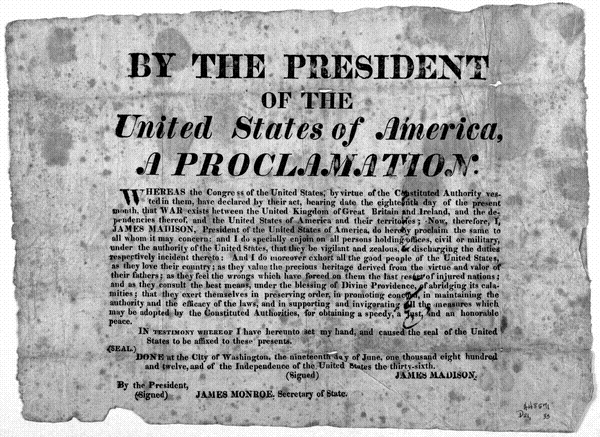James Madison |
Birth: 16 March 1751 |
| Died: 28 June 1836 | |
| Party: Democratic-Republican | |
| Presidency: 1809 ~ 1817 | |
| Vice President: George Clinton, Elbridge Gerry | |
| Nickname: Father of the Constitution |
● Negotiations with Napoleon
James Madison was a direct successor of Thomas Jefferson. James Madison was handed over the USA suffering from the Embargo Act.
Embargo Act caused an economic crisis which didn’t impact the European countries much. Upon Thomas Jefferson’s last and the initial actions of James Madison, the Non-Intercourse Act of 1809 was passed which enabled trades with Europe except for Great Britain and France.

James Madison decides to add the Macon’s Bill number two which put Great Britain and France into a competition.
This bill granted to initiate trades only to the country first to respect the USA’s neutrality while remain the embargo on the other country. Napoleon set terms with the government of James Madison.
The USA resumed trades with France but persist on the embargo with Great Britain.

● New England Factories
Francis Cabot Lowell who was a merchant from New England hired an engineer named Paul Moody to build a cloth-making machine. Francis visited Great Britain and saw the productivity of the textile factories of Great Britain. In 1814, Francis Cabot Lowell has set up the first textile manufactory.


As Francis introduce the manufacturing industry to New England and the USA, the number of the so called ‘New England Factories’ increased and the economy steeply grew thanks to the factory business.
● Relationship with the Native Americans
Since Thomas Jefferson, there were many attempts to convince the Native Americans to join the immigrant society. However, the Native Americans were ignorant of the culture and idioms of the immigrants. More than a hundred million acres of fertile territory of the Native Americans were seized by the year 1810.

The Shawnee tribe chief Tecumseh formed an alliance of tribes from Florida to Canada to rebel against the exorbitant actions of the United States. This legendary warrior rivaled general William Henry Harrison who becomes the 9th president of the USA. During the war of 1812, Tecumseh sides with Great Britain but he was killed in Canada while fighting against Harrison.

● Tom Molineaux
Boxing was a popular sport during the 19th century. Tom Molineaux was a freed slave from Virginia. He found talent in boxing and he started boxing in a competitive level. Tom Molieaux sets sail to England for his boxing career. In 1809. Tom Molienaux became the first American to fight the English champion.


Molienaux challenged Tom Crib who was the English champion in 1810 several times however Tom wasn’t able to win the champion title. The match between Tom Crib and Tom Molineaux was so popular that 40,000 people gathered to watch the match.
● Gerrymandering
The former governor of Massachusetts and James Madison’s second vice president Elbridge Gerry creates an un usual voting district. Elbridge Gerry insisted on keeping this voting district that was shaped like a bird or a lizard. Later on, people noticed that the oddly shaped voting district that Elbridge Gerry insisted were mostly occupied by Democratic-Republican party supporters.

Named after Elbridge Gerry, the term ‘Gerrymandering’ became a term that is defined as “the practice of drawing the boundaries of electoral districts in a way that gives one political party an unfair advantage over its rivals (political or partisan gerrymandering) or that dutes the voting power of members of ethnic or linguistic minority groups (racial gerrymandering).”[1]

● War Hawks
In the midterm elections of 1810, almost half of the Congress members were replaced by much younger and aggressive politicians. These politicians were nicknamed the ‘War Hawks’. Most of the former Congressmen went through the American Revolution and were initial founders of the establishment of the USA.
However, the War Hawks were a different generation and they insisted on war against Great Britain. The War Hawks were also esteemed to expand the territory of the United States and willing to battle against the Native Americans and even breakthrough Canada.

[1] “Gerrymandering.” Encyclopædia Britannica, Encyclopædia Britannica, Inc., 9 Dec. 2022, https://www.britannica.com/topic/gerrymandering.
'International & History' 카테고리의 다른 글
| [USA] - 미국 4대 대통령 제임스 매디슨- 파트 1 (0) | 2023.02.09 |
|---|---|
| [USA] - 4th President of the USA James Madison - Part 2 (0) | 2023.02.07 |
| [USA] - 미국 3대 대통령 토마스 제퍼슨 - 파트 2 (0) | 2023.02.03 |
| [USA] - 3rd President of the USA Thomas Jefferson - Part 2 (0) | 2023.02.03 |
| [USA] - 미국 3대 대통령 토마스 제퍼슨 - 파트 1 (0) | 2023.02.02 |



